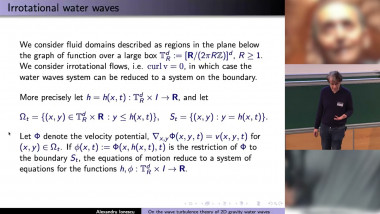
On the Wave Turbulence Theory of 2D Gravity Water Waves
By Alexandru Ionescu

Anomalous Diffusivity and Regularity for Random Incompressible Flows
By Scott Armstrong
Appears in collection : Chaire Jean-Morlet : Equation intégrable aux données initiales aléatoires / Jean-Morlet Chair : Integrable Equation with Random Initial Data
For the commonly studied Hermitian random matrix models there exist tridiagonal matrix models with the same eigenvalue distribution and the same spectral measure $v_{n}$ at the vector $e_{1}$. These tridiagonal matrices give recurrence coefficients that can be used to build the family of random polynomials that are orthogonal with respect to νn. A similar bijection between spectral data and recurrence coefficients also holds for the Unitary ensembles. This time in stead of obtaining a tridiagonal matrix you obtain a sequence $\left \{ \alpha _{k} \right }_{k=0}^{n-1}$ Szegö coefficients. The random orthogonal polynomials that are generated by this process may then be used to study properties of the original eigenvalue process. These techniques may be used not just in the classical cases, but also in the more general case of $\beta $-ensembles. I will discuss various ways that orthogonal polynomials techniques may be applied including to show convergence of the Circular $\beta $-ensemble to $Sine_{\beta }$. I will finish by discussing a result on the maximum deviation of the counting function of Sineβ from it expected value. This is related to studying the phases of associated random orthogonal polynomials.
